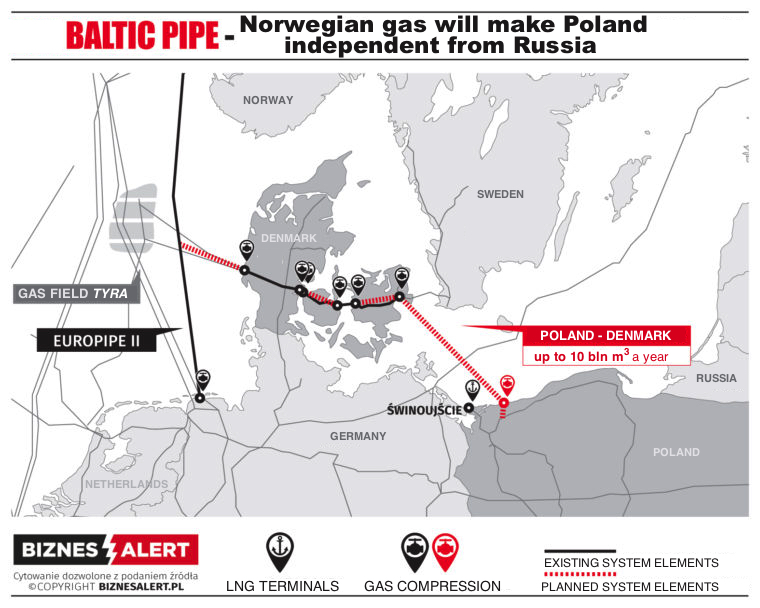What goes on in Poland on the 4th of June.
The environmental permit for the Baltic Pipe section has been revoked
On July 12, 2019, the Danish Environmental Protection Agency issued an environmental permit for the construction of the onshore section of the Baltic Pipe through Denmark. However, the Environment and Food Board of Appeal rejected the permit on May 31, 2021. Work is to be suspended. According to the original schedule, the Baltic Pipe gas pipeline is to be ready in October 2022.
The Danish transmission system operator and the Danish project investor explains that the Danish Environmental Protection Agency issued the environmental permit before providing sufficient explanation on how the different species of small animals (field mice, bats) and their habitats should be protected during the works. The onshore gas pipeline in Denmark is approximately 210 km long.
„When we received the environmental permit in 2019 in the case of the Baltic Pipe, it was confirmed that further work was to be carried out on a number of measures ensuring good living conditions for small animal species that live in some places along the Baltic Pipe route. Since then, we have continued to work on a number of measures to protect those animals. The appeals committee, however, says that all measures should be fully specified before the environmental permit is issued,” Marian Kaagh, Deputy Director and Head of the Energinet Department for Construction Projects said.
Energinet is now working with the authorities to explain the consequences of the decision for the Baltic Pipe project, but is currently preparing to suspend construction until the necessary permits are obtained.
„The Board of Appeal withdrew the environmental permit. Now we need to thoroughly investigate what this means for the Baltic Pipe project, especially construction works in places where the protected species live. The Baltic Pipe is a large construction project that crosses Denmark, but we are fully focused on making the laying of the gas pipeline as low as possible for the environment and animal species,” Marian Kaagh explained and added that Energinet would provide further information as soon as it appeared.
Gaz-System: The withdrawal of the decision in Denmark will not delay Baltic Pipe in Poland
The turbulences in Denmark do not affect the pace of construction of the Baltic Pipe gas pipeline in Poland. The Danes responsible for the onshore section on their territory are to take remedial measures after the withdrawal of the environmental decision.
„Gaz-System informs that the construction works in the Baltic Pipe project, for which the company is responsible, carried out both onshore and in the Baltic Sea, are progressing smoothly and are carried out according to the schedule,” the operator of the Polish gas transmission system, Gaz-System, said in a statement.
Gaz-System confirms that it has been informed by the Danish side of the Baltic Pipe project – Energinet – that the Environmental and Food Appeals Committee has withdrawn the environmental decision previously issued by the Danish Environmental Protection Agency regarding the construction of the onshore section of the Baltic Pipe in Denmark.
The decision of the Danish Appeals Committee does not affect the implementation of the Baltic Pipe project by Gaz-System, the Polish operator ensured. „The company Energinet.dk is currently analyzing the consequences of this decision in the context of the impact on the construction works carried out on land in Denmark, in particular in places where protected species of animals, listed in the appealed environmental decision, live. Gaz-System is in constant contact with Energinet.dk, which is taking remedial actions to clarify the current situation,” the Polish gas TSO stated.
The first investment of the Three Seas Initiative in the energy sector is renewable energy
The Three Seas Fund invests in the Enery photovoltaic company.
The Three Seas Initiative Investment Fund, as it is officially called, invested by purchasing shares in Enery, a company dealing with solar farms. It has 85 MW of photovoltaics in Bulgaria, the Czech Republic and Slovakia, with plans to invest in another 2GW in the Three Seas countries, including Romania, Bulgaria, the Czech Republic and Slovakia.









